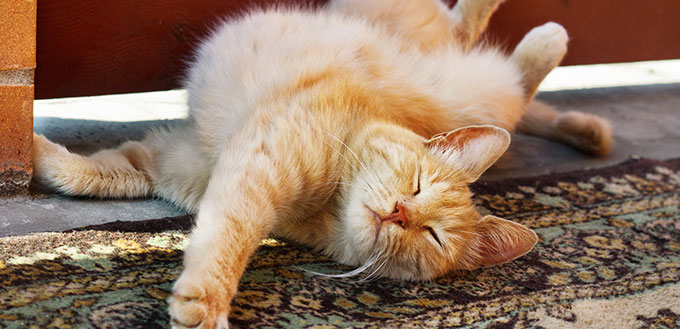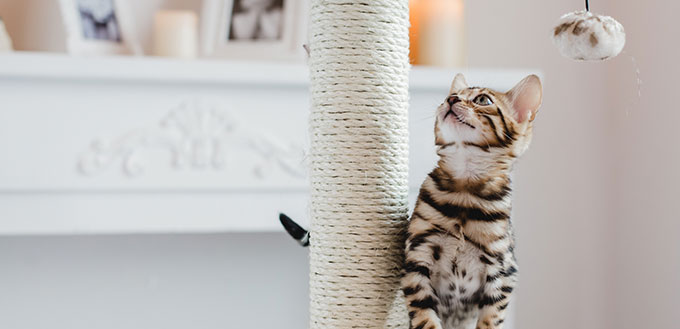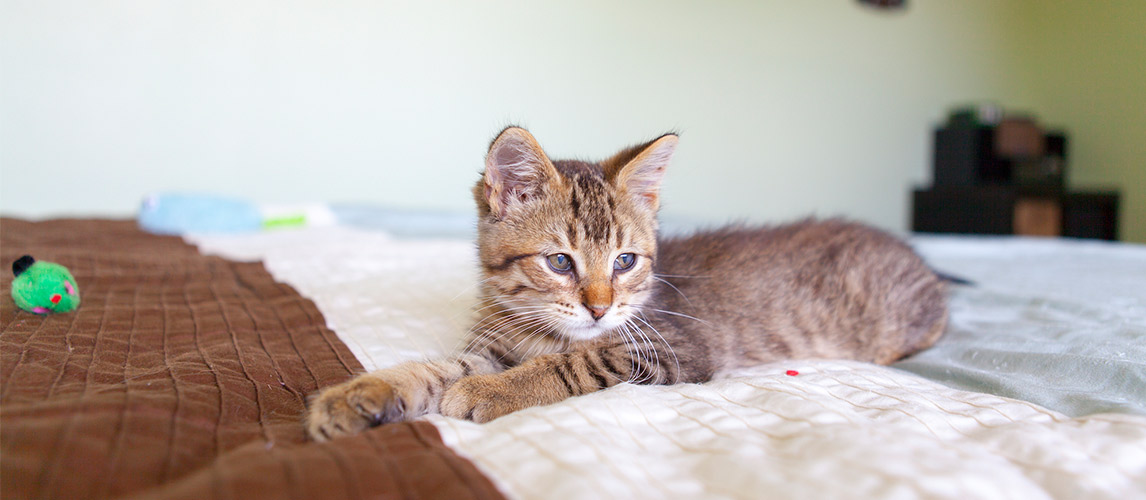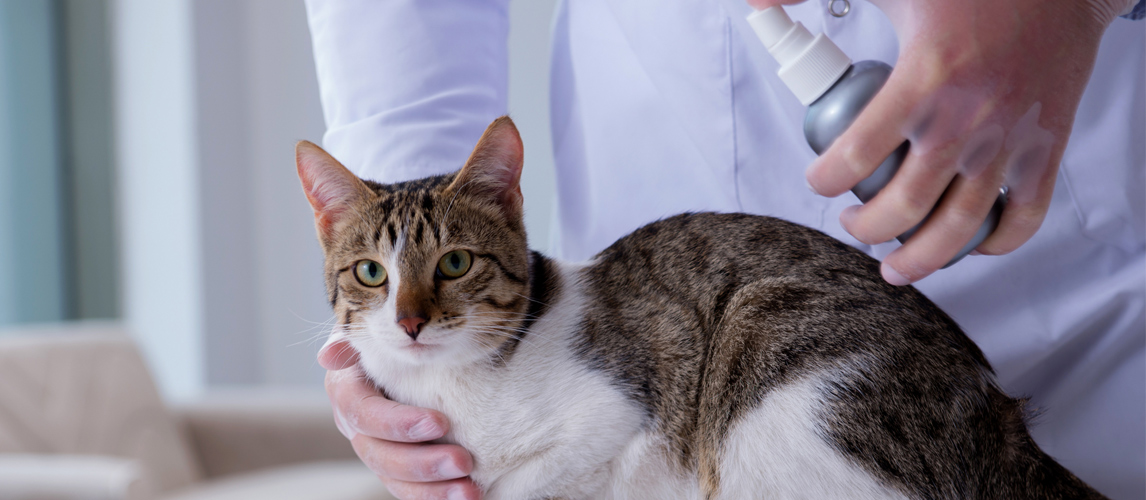If you have ever owned a cat, chances are they have scratched you. They can be grumpy creatures, and even the strongest bond of love can’t stop them lashing out when they are startled or get too aggressive while you are playing with them. Obviously, if you have concerns about your scratch you need to go to a doctor, but there are also some home remedies that can help you stay fit and healthy after your cat takes a swipe at you.
Why Might Your Cat Scratch You?
Although it might seem like it came out of nowhere, there is almost always a good explanation for a cat lashing out at you. There are generally two simple explanations for your cat scratching you: aggression and fear.
- Aggression occurs when your cat acts on their predatory instincts. This can happen during play, or when they come face to face with another cat or the unknown.
- Fear occurs when they are feeling scared or threatened. This may be due to anything from sudden loud noises to the presence of strangers or a visit to the vet.
If you are unsure why they attacked you, you should look at their eyes, provided it is safe to do so. Large pupils may suggest fear, while small pupils may suggest focus and aggression.
If your cat is exhibiting frequent aggressive behavior, you may need to consider behavior training. You may not have intended to, but, back when they were kittens and the sight of them nibbling at your toes was cute, you may have taught them that your hands and feet are toys to be attacked. This needs to be trained out of them.
You might also want to consider this route if your cat is unnecessarily stressed and anxious. They can be trained to react more calmly to certain stimuli. If this is the case, you can also modify their environment to include more perches and hiding spaces to make them feel more comfortable.
You May Also Like: Cat Calming Treats
De-clawing your cat might sound like a good idea, and it is for many cats, but before you make the decision to do this, you should also consider what else your cat might need their claws for. De-clawing an outdoor cat might be a bad idea as you are taking away their defense against any potential aggressors they might encounter. Even if your cat is not much of a fighter, cats also use their claws to escape from danger. They can climb trees to run away, for example. Without their claws, they might not be able to escape from potential predators.
Related Post: Best Cat Scratching Tower

Why Should You Treat a Cat Scratch?
Cat scratches might seem like nothing, but it is still a good idea to consider preventative treatment. This is because cat scratches can become more serious than you might expect. There is a lot that can go wrong from a simple cat scratch, and much of this is preventable if you disinfect and treat your wound as soon as you can. If you leave it until later, bacteria can spread and you could become seriously ill.
Infections are the most obvious concern with an open wound. Bacteria can get into a wound and spread around your bloodstream, making you very ill. Unfortunately, your cat may be covered in bacteria, making cat scratches a bit more high risk than any old paper cut. Some bacteria are worse than others and a particular issue to look out for is cat scratch disease.
Cat scratch disease, or cat scratch fever, has approximately 12,000 diagnosed cases every year. It is caused by the bacteria Bartonella and originates in fleas. As well as being transferred when an infected cat scratches you, you could be infected when they lick any other open wound you may have, or if they bite you. It can take as long as 14 days for symptoms to manifest, but watch out for:
- A fever
- Fatigue
- A decrease in appetite
- Signs of infection
It is also worth being particularly aware of cat scratches on your hands and feet. While you are more likely to get scratched there because that is how you most often interact with your cat, it is also where you are most likely to get infected because that is how you most often interact with the world. You should also be concerned about scratches to, or near, the eye, as those infections might even result in blindness.
As always with health concerns, be most careful with those that are more vulnerable to disease and have a weakened immune system. This includes babies, the elderly, and anyone with an autoimmune disease.
How do You Treat Your Cat Scratch?
When you do catch your cat on a bad day and they cut you with their claws, most of the time nothing bad happens and it is just like getting a paper cut. If you want to play it safe, or just relieve some of the normal issues that come with a small cut, here are five easy home-remedies that you can try.
1. Keep it clean
It might seem obvious, but step one should always be a good clean out of the wound. A little bit of water might not be enough to do the trick, particularly for a deep cut, so use warm water and soap. A common misconception is that the best thing to do is scrub a wound deeply and vigorously. Over scrubbing could increase the damage and deepen the wound, and doesn’t actually do much good against bacteria. Soap and other disinfectants need time to work, much more than vigor.
Try singing a nursery rhyme like ‘The Wheels on the Bus’ while you wash the wound to make sure the soap has the two or three minutes necessary to kill any germs. If you don’t have any soap, or if the wound is particularly deep, break out the rubbing alcohol and use a swab.
Even if you are out and about, perhaps if you’ve taken your cat for a walk, you should take steps to clean the wound as best you can. At worst, you should pour water over the wound, but if you have any witch hazel, antiseptics, rubbing alcohol or soap, you should try to use that.
2. A spoonful of honey
If you are looking for an alternative antiseptic, honey is a great solution. It might be that you don’t have access to rubbing alcohol or witch hazel, or perhaps you have sensitive skin or an allergy. To replace them, you can use honey by simply putting it over the wound and giving it time to work its magic. As it is sticky stuff, you will need warm water, and maybe a bit of soap, to wash it off.
Honey has so many benefits. It is an antiseptic, a natural antibiotic, has anti-fungal properties, and is an anti-inflammatory. This means it will deal with the germs in the wound and might provide minor pain relief. Honey draws water out of your wound, dehydrating the bacteria, and keeps it dry enough so that it can heal with minimal scarring. Be certain that you are using real, pure honey. Sugar and corn syrup alternatives do not have the same healing benefits.
3. Baking Soda
Fresh wounds are often annoyingly itchy, but scratching them can prevent recovery and risk infection. If you are worried that your itchiness is a sign of infection, you should visit a doctor, but if you are just distracted and irritated by it, then you can turn to baking soda.
The itching sensation in a wound is a result of your body starting the healing process. It means that your body’s histamines and other inflammatory substances are being utilized to battle allergens that may be attacking your system through your wound.
To use the baking soda, also known as sodium bicarbonate, you can make a paste out of one part baking soda to three parts water, then apply it to the wound. Here’s an extra tip – baking soda also works well on infuriating mosquito bites, poison ivy and rashes!

4. Vitamins
Your wound could also do with some vitamins to help it to heal, and there are three key vitamins that will help with this: vitamin A, vitamin D, and vitamin E. If you can get your hands on these vitamins as ointments, you can put them on the wound. You can try taking the vitamins orally, but this might be unnecessary for just a little scratch. The benefits of each vitamin includes:
- Vitamin A helps with inflammation, much like histamines
- Vitamin D also helps with inflammation, and can battle allergens and other bacterial invasions
- Vitamin E is an antioxidant that can help by soothing the wound and may aid the healing process by as much as 20%
Check out: Vitamins For Cats
5. Visit the pharmacy
There are plenty of over-the-counter remedies that can help cat scratches. If you have many cats, or have a particularly anxious cat who is likely to scratch you often, you may want to ensure you have your favorite over-the-counter treatments in your medicine cabinet ready to go.
These might include antibiotics and vitamin treatments. You should save hardcore treatments, like antibiotics, for serious situations, such as being scratched by a feral or strange cat. If you don’t know where they have been, you are more likely to be risking infection.
It is worth discussing that the overuse of antibiotics can be very damaging for society. Antibiotics resistance is a very real concern that occurs when your body becomes inoculated against the benefits of antibiotics, just as you might become resistant to a cold virus or the flu. This resistance can be passed on to your children, and before long we may be facing a world where antibiotics no longer work.
Obviously, if you are battling a serious infection and your doctor prescribes you antibiotics, you should take them, but you should avoid leaning on antibiotics as a precautionary measure, or without a prescription.
Go to the doctor
As we have discussed, wounds and scratches can become very serious and I am not a doctor. There are many occasions in which you might need genuine medical attention, such as with cat scratch disease or infection, so our bonus, sixth piece of advice is to go to the doctor if you have any concerns that it might be an infection, or worse. Symptoms of infection may include:
- Swelling
- A ring of redness around the wound
- An odor emanating from the wound
- Any discharge from the wound
- A fever
- Fatigue
The five tips for home treatment we have described are useful for small cuts and can protect against problems such as pain and infection, but they won’t cure anything that has already taken hold. You should always be cautious and this probably means consulting a professional.
Getting Scratched by a Feral Cat
Another little bonus tip we’d like to share with you is what to do if you get scratched by a unknown cat, particularly if it results in infection. A very mild scratch brought on by explainable fear may not be a major concern, but an aggressive or infected cat is likely to be a danger to other animals and people in the neighborhood. Contact your local health department so that the experts can assess the situation. They might decide that the animal needs to be found, tested or quarantined for rabies or any other health concern.
The cat might also be carrying rabies, and they may need to be tested so your own risk of rabies infection can be ascertained, particularly if you are bitten. If the cat cannot be found, and therefore cannot be tested, you may need a precautionary rabies shot. Tetanus may also be a concern if you have not had an inoculation within the last 10 years. The bottom line is that you should definitely contact a doctor if you are bitten, or even just scratched, by an unknown, feral cat.
Source:
-
Matt Wildman, Cats: Destructive Scratching, The Humane Society








Stop spraying him . Wear long sleeves or buy protective sleeves that cover arms and hands .Give him CBD oil for pets from Lazarus Naturals . It will calm him and reduce his anxiety. Be kind and be patient . You can also have soft paws nail caps put on him . Call a vet or groomer .
Stop spraying him . Wear long sleeves or buy protective sleeves that cover arms and hands .Give him CBD oil for pets from Lazarus Naturals . It will calm him and reduce his anxiety. Be kind and be patient .
Matt, my 18 month old Ragdoll has scratched and even nipped me many times. My skin is paper thin
and breaks or bruises very easily. When my cat is in the mood for my attention he jumps up and seems to
try to catch me–mostly with his paws.
When I remember I spray on a lemon-based plant deterrent that keeps him away from my arms and hands.
He bores quickly with his toys, seldom playing with one more than a day. I yell, sometimes use my water
pistol, and today I put him on the screened-in porch.
He is the only cat I have owned who will not get in my lap. Yet he is always nearby , watching. II I give him away,
I fear that no one will put up with this and he will end up in a shelter. Can you help?